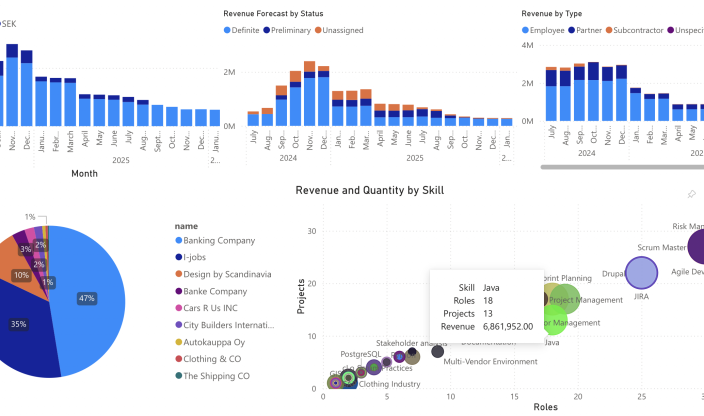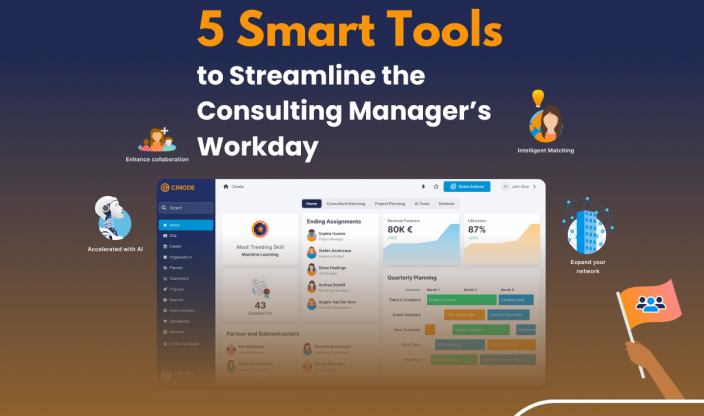Compensation Models in Consulting Firms

When you are looking for a new job opportunity as a consultant you have probably noticed that consulting firms are offering a plethora of different salary models. All models have their pros and cons, and below we will have a look at the most common variations.
Fixed salary
Just like most employees in Sweden, there are consultant companies that offer a fixed salary to their consultants.
Pros: You know what you get each month, and you don’t have to worry about missing out on assignments.
Cons: No extra pay if you are doing well, meaning if you are an easy sell and get long-lasting assignments. The profits from your labour go straight to the company you work for.
Fixed salary with bonus
Many consultant companies set a relatively high fixed salary and then add a bonus that is paid if the consultant can reach a certain billing rate. If you for example bill 90% one month you get a bonus as an extra that month.
There are variations of this model, such as if you have a basic salary and then get an add-on per hour on top of your fixed salary. You could for example make 3,500 Euro per month and an added 10 Euro per billed hour.
Pros: Low risk with a bit of a carrot on a stick.
Cons: This usually means that you get a lower fixed salary, and you still don’t have the opportunity to make a lot of extra money.
Basic salary with commission
A common model among consultant companies is to offer their employees a basic salary that is lower than a fixed salary and on top of that a commission on the hours they bill. This could for example be 2500 Euro per month or 65 percent of what you bill. How much you bill is usually calculated per month, but there are also variants to this, for example by calculating it per quarter or 6 month period.
If you are missing out on assignments, or if you are on vacation, you still get your basic salary – if not you get your percentage based part of your income.
Pros: You make good money and still have some kind of security.
Cons: There is more risk in this model, and you have to consider if your basic salary is enough for you to live on. You also need to consider that this might mean that to a greater extent you have to accept “boring” assignments where you don’t develop as much, at least if you are in need of money.
Pure provision
When you work on your own your risk also increases. No billed hours means no income. On the other hand, if things are going well you get the entire profits to yourself. However, perhaps you would like to decide your own levels of billing and get to keep most of what you earn while still being a part of something bigger? Having colleagues, a big network of sales staff and managers that can help you out. If that’s the case, there are consulting companies that offer you for example 75% of what you make while still supporting you with everything else.
Pros: Great pay and freedom to pursue the jobs you want.
Cons: Higher risk – no assignment, no money. Do you have the guts to wait for your dream assignment or will you grab onto the first best assignment where you actually get paid?
If you are working on commission it is important that you make sure that the money you miss out on still gives you value in the form of networking, sales, marketing, and other things that are important to you in the long run.
Bonuses and partnerships
Salary is not everything. Many consultant companies also offer yearly bonuses that can be both individual and company-wide. Sometimes you also have the opportunity to become a partner and buy shares in the company. This can be profitable long-term when it comes to dividends and value appreciation. Do keep in mind though that most companies have the requirement that you are an employee before you can own shares in the company, which may result in you feeling trapped in the company. Perhaps this will mean that you won’t pursue other options since you want to keep your shares? If the company is not listed or if it will be listed shortly it can also be difficult to sell, and your shares might not be worth as much as you would like.
Freedom
A lot of companies, usually smaller consultant companies, allow their employees to decide their own salary model, meaning how much you want to take out in the form of salary and how much is going to go to education, retirement etc.
Things to keep in mind
There are many salary models. Take some time to think about what is most important to you and what benefits you the most. There are many commission based models that are beneficial, but if you do the math it is often the consultant that is taking a high risk without getting paid enough.
When you have chosen your compensation model it is time to negotiate your salary. What is your preferred model and why? And, what is your best advice regarding salary negotiations within the area of consulting?

Johan Haeger - Head of Enterprise Sales, Cinode
Johan Haeger - Head of Enterprise Sales, Cinode
You may also like...
All posts
Oct 15 2025 · Economic Reports, Sales
Konsultkollen 2025: Growth Slows Significantly in the Swedish Consulting Sector

Oct 10 2025 · Consulting, Entrepreneurship
🚀 The Head of Analysis: Seven Success Factors for Consulting Firms 2025–2030

Sep 10 2025 · Consulting
“It’s About Growing Right – Not Fastest” – Netlight Scales Up with Culture and AI in Focus

Aug 21 2025 · Cinode, Consulting
🚀 A Clear View and Fast Execution – Our Journey with Cinode

Apr 30 2025 · Consulting
Understanding the psychology behind pricing

Apr 15 2025 · Consulting
How to set (the right) price?

Mar 18 2025 · Consulting
How do we charge for the value of our services?

Mar 11 2025 · Consulting
New AI Act: Checklist for Consultants and Consulting Firms

Feb 27 2025 · Consulting
Maximize Insights in Your Consulting Business with Cinode and Power BI

Jan 31 2025 · Consulting
5 Smart Tools to Streamline the Consulting Manager’s Workday

Jan 29 2025 · Consulting
New guide: How to Build Consultant Resumes That Win Clients

Nov 05 2024 · Consulting
